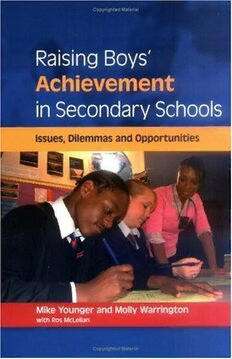
Raising Boys' Achievements in Secondary Schools PDF
225 Pages·2005·1.59 MB·English
Most books are stored in the elastic cloud where traffic is expensive. For this reason, we have a limit on daily download.
Preview Raising Boys' Achievements in Secondary Schools
Description:
'Boys' achievement has attracted great attention in recent years in many countries. This comprehensive book based on sound research in schools provides practical insights into how the achievement of boys and girls can be raised. It reminds us that it is not all boys or no girls who underachieve. It demonstrates the respective roles of teaching and learning, school culture and social factors. No easy answers but excellent ideas backed by evidence from authoritative, thorough researchers with a firm basis in schools' - Judy Sebba, Professor of Education, University of Sussex.'Teachers will find this book invaluable. It is based on quality research which actually evaluates the impact of the various strategies suggested for raising boys' achievement. What is more, in contrast to many of the more 'quick-fix' works in this field, the authors' discussion and analysis is measured and nuanced, and supported by an in-depth understanding of the wealth of theory and research around gender and achievement. It provides a welcome and weighty contribution to an ever controversial debate' - Becky Francis, London Metropolitan University.In this important book, the authors evaluate different approaches and advocate practical, evidence-based strategies, which have the potential to promote boys' as well as girls' achievements. The approaches are discussed within the context of inclusivity, acknowledging the diverse needs and interests of different boys and the invisibility and continuing disadvantage of some girls. The book begins and ends with reflections from students of their own school experiences, and makes practical recommendations for the future.This book draws upon empirical research and work initiated as part of the DfES project on Raising Boys' Achievement. It brings together theoretical and practical issues, and reflects upon the construction of the debate about boys' apparent under-achievement from the perspectives of girls as well as boys. The authors critically explore notions of under-achievement and 'value added', and consider how useful the concept of the 'gender gap' is in advancing the debates. "Raising Boys' Achievement in Secondary Schools" is key reading for undergraduate and postgraduate Education students, PGCE students, headteachers, senior managers within schools and local education authorities, and policy makers.
See more
The list of books you might like
Most books are stored in the elastic cloud where traffic is expensive. For this reason, we have a limit on daily download.
